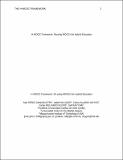H-MOOC framework: reusing MOOCs for hybrid education
Author(s)
Pérez-Sanagustín, Mar; Hilliger, Isabel; Alario-Hoyos, Carlos; Kloos, Carlos Delgado; Rayyan, Saifuddin
Download12528_2017_9133_ReferencePDF.pdf (518.9Kb)
PUBLISHER_POLICY
Publisher Policy
Article is made available in accordance with the publisher's policy and may be subject to US copyright law. Please refer to the publisher's site for terms of use.
Terms of use
Metadata
Show full item recordAbstract
Since Massive Open Online Courses (MOOCs) started to become part of the scene of Higher Education (HE), many institutions have joined the race of MOOC creation. However, producing MOOCs has shown to be a cumbersome and expensive activity for HE institutions. For this reason, many universities have started to explore and experiment with hybrid initiatives in which locally produced and third-party MOOCs are reused and integrated into traditional courses. Most of the hybrid initiatives described in the literature so far focus on flipped classroom experiences, although there are some other possibilities for integrating MOOCs in the curriculum. Moreover, few studies have reported on the institutional support required for implementing hybrid initiatives, and their benefits from a curriculum perspective. In order to shed some light on the opportunities that arise from the reuse of MOOCs, this paper presents H-MOOC, a framework that describes hybrid MOOC-based initiatives as a continuum of two factors: (1) institutional support to reuse an existing MOOC, and (2) curricular content alignment between the MOOC and the program, or the course hybridized. In addition, H-MOOC proposes indicators to measure the impact of these initiatives at both educational and institutional levels. Examples of actual hybrid initiatives and a set of guiding questions are presented to show how to apply the H-MOOC framework in different contexts.
Date issued
2017-01Department
Massachusetts Institute of Technology. Department of Physics; Massachusetts Institute of Technology. Research Laboratory of ElectronicsJournal
Journal of Computing in Higher Education
Publisher
Springer US
Citation
Pérez-Sanagustín, Mar, Isabel Hilliger, Carlos Alario-Hoyos, Carlos Delgado Kloos, and Saif Rayyan. “H-MOOC Framework: Reusing MOOCs for Hybrid Education.” Journal of Computing in Higher Education 29, no. 1 (January 24, 2017): 47–64.
Version: Author's final manuscript
ISSN
1042-1726
1867-1233